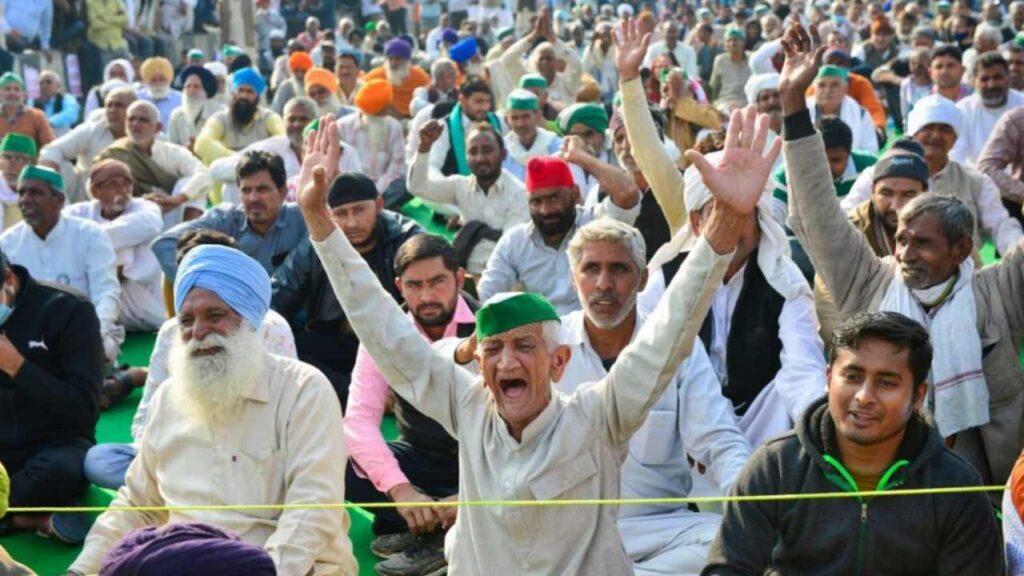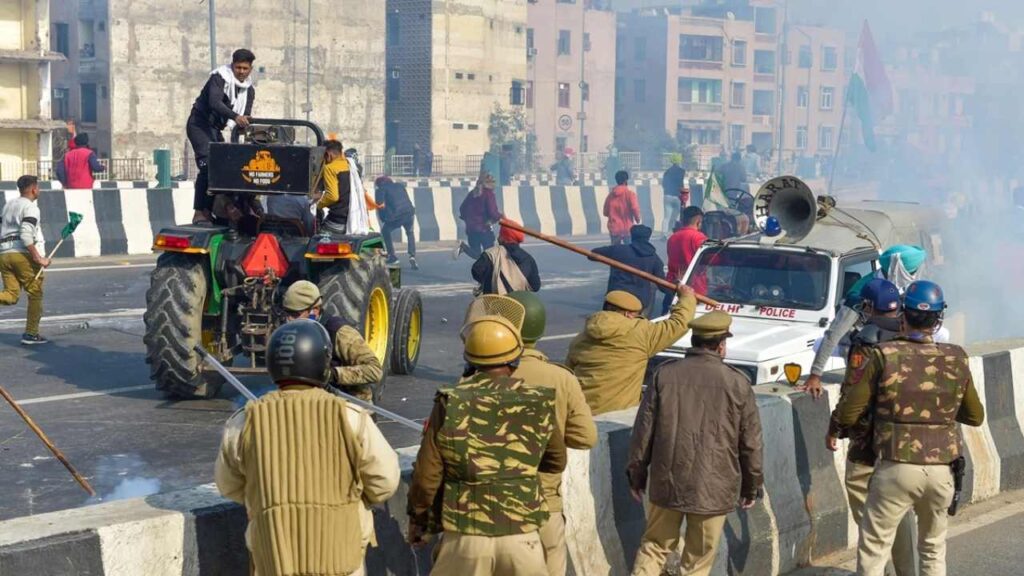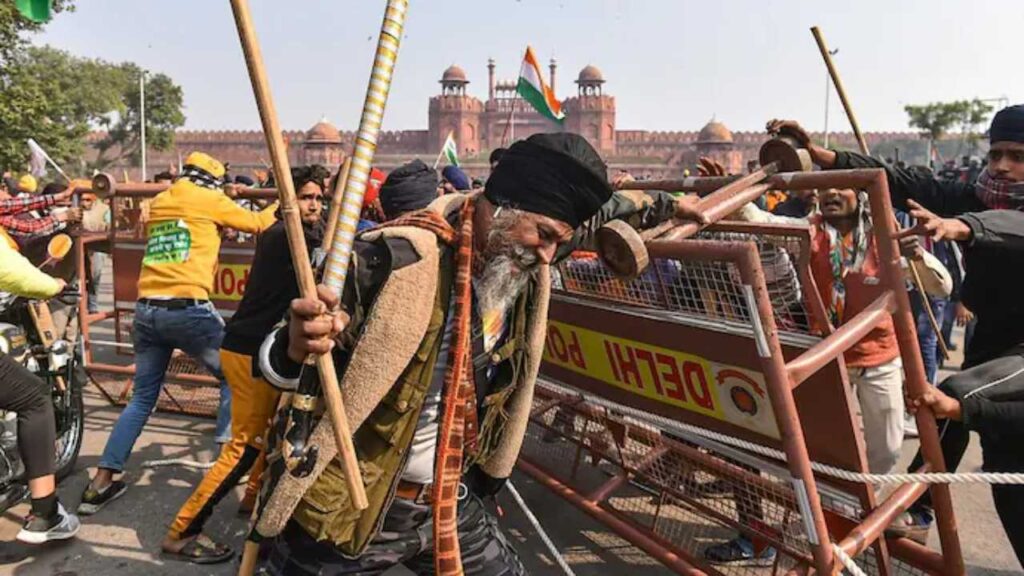In 2020, the farmers forced the Modi government to take back three farm laws after a year-long protest at Delhi’s borders. After three years, Punjab farmer groups are back with a new set of demands, the major on being the legal guarantee of minimum support price for crops.
Who is Leading the Protest?
Following the current farmer protests in India, especially in Punjab, a notable evolution is taking place reorganizing the farmer organization landscape. The 2024 protest is being led by 250 farmers’ unions under the banner of Kisan Mazdoor Morcha and the Samyukta Kisan Morcha (non-political), a platform of 150 unions. The two have collaborated for the infamous, ‘Delhi Chalo (2.0)’.

SKM (non-political)
Samyukta Kisan Morcha-SKM (non-political) is a breakaway group of Samyukta Kisan Morcha. It is led by Jagjit Singh Dallewal, president of the Punjab-based Bharatiya Kisan Union (BKU) Sidhupur farm union. The presence of SKM is also evident in Haryana, Rajasthan, and Madhya Pradesh.
In collaboration with the Kisan Mazdoor Morcha the alliance organized protests in Amritsar and Barnala to advocate for ‘Dilli Chalo 2.0,’ which would encourage farmers’ voices on a national level.
Kisan Mazdoor Morcha
Kisan Mazdoor Morcha, founded by 18 farmer groups, grew into a strong block that included farmer groups from Punjab, Haryana, Rajasthan, Uttar Pradesh, and Madhya Pradesh. The morcha, led by Punjab-based Kisan Mazdoor Sangharsh Committee leader Sarvan Singh Pandher, collaborated with SKM (non-political), bringing farmers together across different states.
Sanyukt Kisan Morcha (SKM) remains intact after internal fractions
– Balbir Singh Rajewal and Jagjit Singh Dallewal’s splits led to the emergence of new groupings, however Rajewal rejoined SKM on Jan 15 along with four other groups. SKM organized marches throughout Punjab on January 26 and called for a Grameen Bharat Bandh on February 16, indicating its ongoing involvement and mobilization capability.
Other Groups
After the 2022 elections, a coalition comprising BKU (Rajewal), All India Kisan Federation, Kisan Sangharsh Committee Punjab, BKU (Mansa), and Azad Kisan Sangharsh Committee was formed.
Split in the largest group
BKU (Ekta Ugrahan), Punjab’s largest farmer group, underwent a split led by senior leader Jaswinder Singh Longowal, resulting in the foundation of BKU (Ekta Azad). The group has collaborated with KMSC to join Kisan Mazdoor Morcha.
Another Split
Another important split within BKU (Ekta Dakaunda) resulted in the formation of two parallel outfits: BKU (Ekta Dakaunda), led by Buta Singh Burjgill, and Ekta Dakaunda (Manjit Dhaner), led by Manjit Singh Dhaner.

What are the demands of the farmers?
In 2020, the government announced three farm laws which promised a rise in prices to farmers by linking them to open markets. Government’s objective was to double farmer incomes, however the farmers rejected the laws and protested against the new laws. Farmers claimed that the new laws will dominate private companies in the market, thus weakening the profits for farmers.
Main Demands
- Farmers are demanding legal guarantee minimum support price (MSP) for all the crops, which was also one of the demands during 2020 protests.
The Commission on Agricultural Costs and Prices’ recommendations provide the basis for the government’s twice-yearly determination of the MSP for about two dozen crops. The majority of the agricultural products purchased under the MSP come from Punjab and Haryana, primarily from the production of wheat and rice, which supports the public distribution system of the government. A law that assures MSP on every crop is what farmers demand. On the other hand, the government is concerned about a number of issues related to the desire for a legal guarantee, including international pricing, pressure on government procurement, export competitiveness, and central expenditure.
- Implementing the recommendations from MS Swaminathan committee on agriculture is another important demand. The founder of the Green Revolution, agroscientist Swaminathan, was recently awarded the Bharat Ratna.
- Raising MSP to a minimum of 50% over the weighted average cost of production was one of the committee’s primary recommendations.
- Farmers are asking the center to take action against the accused in the Lakhimpur Kheri event.
- Another demand is the donation of land in Delhi for a memorial dedicated to the ‘martyrs’ of the previous farmers’ protest.

Other demands:
- Better sugar cane prices.
- A pension of Rs 10,000 per month for all farmers over 60.
Lakhs of farmers had gathered together in 2020 holding emotional rallies, making the atmosphere tense at the center. The result of the protest was economic loss and disruption in the mobilization of goods, resulting in business chaos. This time, around 25,000 farmers, along with their 5,000 tractors, are estimated to be part of Delhi Chalo 2.0. However, experts predict that the number of protesting farmers at the Delhi border might rise within a few weeks after the protests begin, as other farmer unions may join.
Two Meetings held to Defer the Protest
Three Union ministers, Piyush Goyal, Nityanand Rai, and Arjun Munda, visited Chandigarh last Thursday to pursue discussions with the farmer leaders. The meeting was mediated by Punjab Chief Minister Bhagwant Mann between the Centre and the farmer leaders.
This evening, another meeting is scheduled in Chandigarh. The government has claimed to have an open mind for the conversation. SKM (non-political), the umbrella bloc, has said that the talks will continue, but there will be no stopping to the Delhi Chalo march.

Will the protest be the same as in 2020?
Factions among the farmers
Khaps, the Jat community organizations, have yet to enter the protests. Two khaps are said to have appealed to the farmers to negotiate with the government, considering the massive losses and economic inconvenience faced by the people in the 2020 protest.
Elections and the Harvest season on their way
With the harvest season coming up, the protests may not endure the circumstances as last time. In addition, the upcoming Lok Sabha elections may necessitate farmers’ return to their villages. These two factors indicate the farmer protests may not be of the same level as the last one.
However, in the last months, factionalism was also witnessed in the SKMb but didn’t last long. According to sources, the quantity of protesters depends on the talks with the center. “If they fail to address our demands, others will join in too,” one of them said.
The security strategy could deescalate the protests, but farmers seem adamant about blocking every obstacle they face, as they did in the previous protests.
Coverting Stadiums into Makeshift Jail
In response to the request from center to transform the Bawana Stadium into a makeshift jail, Delhi Home Minister Kailash Gahlot wrote to Chief Secretary Naresh Kumar denying the permission, “The demands of the farmers are genuine. Also, the constitution gives right of every citizenfor peaceful protest” Gahlot’s letter read.
Additionally, he expressed solidarity with the farmers, they added, “The central government should invite the farmers for talks and try to find a solution of their genuine demands. Farmers of the country are our ‘annadata’ and aressting them like this will be a disrespect to us. We cannot be a collaboarte to this decision of the Central government.”
On the other hand, the Haryana government has transformed two large stadiums, Chaudhary Dalbir Singh Indoor Stadium in Sirsa and Guru Gobind Singh Stadium in Dabwali, into makeshift jails ahead of the farmer’s ‘Delhi Chalo’ march.


